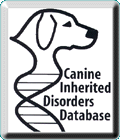
Complement deficiency
Complement is a system of linked proteins that are an important part of the immune system. C3 is deficient in dogs with complement deficiency, and the result is an increased susceptibility to bacterial infections, and immune-related kidney disease.
This is an autosomal recessive trait. Dogs that are homozygous for the trait have no detectable C3, while heterozygous dogs have serum C3 concentrations approximately 30 to 50% of normal. Only homozygous dogs are clinically affected, but heterozygotes (carriers) can pass on the trait to their offspring.
From a young age, affected dogs are more likely to be infected by bacterial infections, including serious and widespread ones (septicemia). They may also develop kidney disease.
This disorder is rare. Your veterinarian may begin to suspect an immune deficiency when your pup has recurring bacterial infections. The diagnosis of complement deficiency is made based on a blood test showing little detectable C3.
Antibiotics are used as needed to treat the infections. There is no treatment for the condition itself.
Dogs that are homozygous have less than 10% normal serum C3. Heterozygotes have 30 to 50% normal levels.
Besides recurrent bacterial infections, affected dogs are prone to renal amyloidosis or membranoproliferative glomerulonephritis, relating to immune complex deposition.
Affected animals and their parents should not be bred. Any family members to be used for breeding should have blood tests to determine that they have normal serum C3 levels (in other words, that they are not carriers of the trait, in which case they should not be used for breeding).
FOR MORE INFORMATION ABOUT THIS DISORDER, PLEASE SEE YOUR VETERINARIAN.
Ackerman, L. 1999. The Genetic Connection: A Guide to Health Problems in Purebred Dogs. p. 94. AAHA Press, Lakewood, Colorado.
- Disorder Type:

